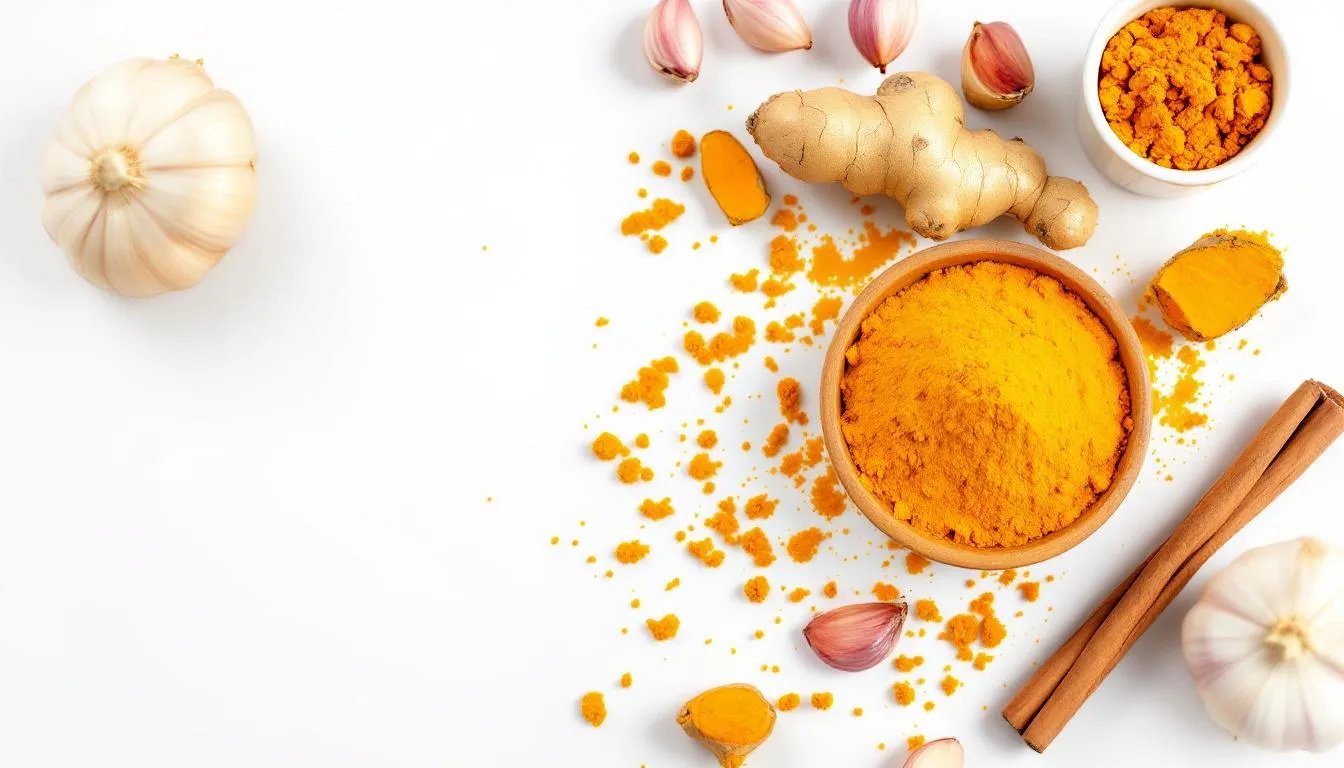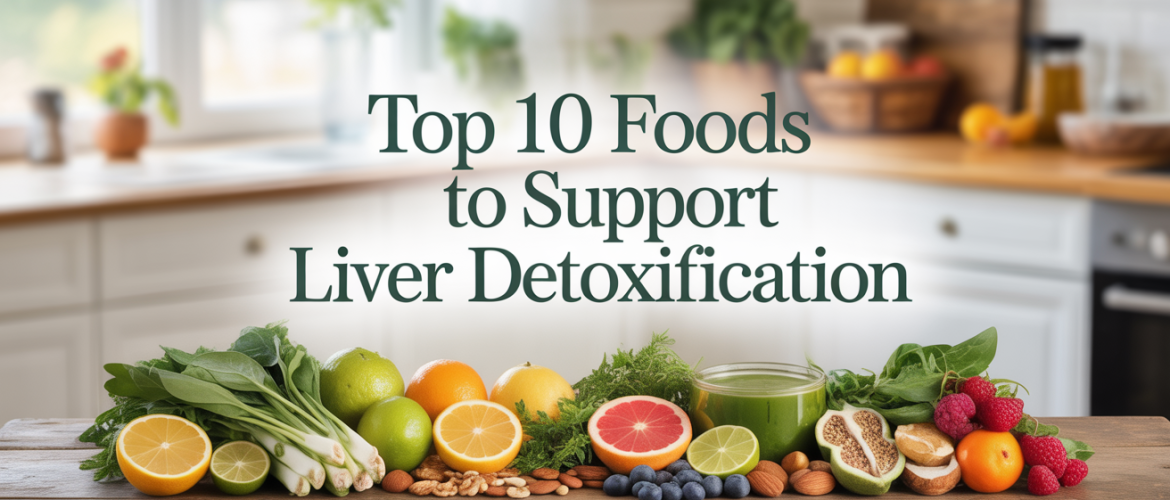Top 10 Foods to Support Liver Detoxification
The liver is one of the hardest-working organs in the body, responsible for filtering toxins, metabolizing nutrients, and supporting overall health. Without a well-functioning liver, our bodies struggle to eliminate harmful substances, which can lead to fatigue, inflammation, and even chronic disease. A diet rich in specific foods can play a vital role in supporting the liver’s natural detoxification processes. In this article, we’ll explore the top 10 foods that promote liver health, backed by science, and explain how they work to keep your body running smoothly.
Understanding how food impacts liver function is essential for maintaining long-term wellness. From cruciferous vegetables to antioxidant-packed berries, these foods not only support detoxification but also protect against oxidative stress and inflammation. By incorporating these nutrient-dense options into your meals, you can give your liver the tools it needs to thrive. We’ll also touch on how Inside Health Clinic can guide you in creating a personalized plan to optimize liver health through diet and lifestyle changes.
Why Is Liver Detoxification Important?
The liver performs over 500 vital functions, including filtering blood, breaking down toxins, and producing bile to aid digestion. Its detoxification process involves two phases: Phase I converts toxins into intermediate compounds, while Phase II neutralizes these compounds so they can be excreted from the body. When these processes are overwhelmed by excessive toxins or poor nutrition, the liver’s efficiency declines, leading to a buildup of harmful substances. This can result in symptoms like bloating, fatigue, and even more serious conditions such as fatty liver disease.
A healthy liver is crucial not just for detoxification but also for maintaining energy levels, hormonal balance, and immune function. Supporting its ability to process and eliminate toxins ensures that your entire body operates at its best. By focusing on foods that enhance liver function, you’re taking a proactive step toward protecting your long-term health. Let’s dive deeper into how diet plays a key role in this process.
How Diet Supports Liver Function
Nutrients, antioxidants, and phytochemicals found in whole foods can significantly boost liver health by enhancing its natural detoxification pathways. For example, sulfur-containing compounds in garlic and onions help upregulate enzymes that break down toxins, while antioxidants in berries combat oxidative stress. These dietary components work together to reduce inflammation, improve enzyme activity, and protect liver cells from damage. On the other hand, poor dietary choices-such as consuming processed foods, sugary drinks, and excessive alcohol-can impair liver function and contribute to conditions like non-alcoholic fatty liver disease (NAFLD).
Incorporating a variety of nutrient-rich foods into your diet not only supports liver detoxification but also promotes overall wellness. At Inside Health Clinic, experts can help tailor a nutritional plan that prioritizes liver health while addressing individual needs. With the right guidance, you can make informed choices that benefit both your liver and your entire body. Now, let’s explore some of the most powerful foods for liver detoxification.
“Phytonutrients in cruciferous vegetables, including a rich amount of glucosinolates that are hydrolyzed to bioactive isothiocyanates such as sulforaphane, regulate liver enzymes, phase I cytochrome P450 (CYP450) enzymes, and phase II conjugation enzymes to increase biotransformation rates.” -IFM
Coffee and Tea: Daily Beverages for Liver Health
Coffee is more than just a morning pick-me-up-it’s also a potent ally for liver health. Research shows that coffee contains antioxidants and anti-inflammatory compounds that can boost liver enzyme levels and reduce the risk of liver diseases, including cirrhosis and cancer. Moderate consumption, typically defined as 2-3 cups per day, has been linked to improved liver function and a lower risk of fibrosis. However, it’s important to avoid adding excessive sugar or creamers, which can negate these benefits.
“Coffee…may boost antioxidant levels in your liver and lower the risk of liver disease. Popular teas like black and green tea may improve liver enzyme levels among people with liver disease and fight oxidative stress.” -Healthline
Green and black tea are equally impressive when it comes to supporting liver health. These teas are rich in catechins and polyphenols, which have been shown to reduce oxidative stress and improve liver enzyme levels. Studies suggest that regular consumption of green tea may even help prevent fat accumulation in the liver. Whether you prefer a warm cup of coffee or a soothing mug of tea, these beverages offer simple yet effective ways to nurture your liver daily.
“Studies have shown that extracts from Brussels sprouts and broccoli sprouts increase levels of detoxification enzymes and protect the liver from damage.” -Vinmec
Cruciferous Vegetables: Powerful Plant Support
Broccoli, Brussels sprouts, and mustard greens are part of the cruciferous vegetable family, known for their liver-supporting properties. These veggies contain glucosinolates, compounds that break down into bioactive molecules like sulforaphane, which help regulate detoxification enzymes. Sulforaphane has been shown to increase the liver’s ability to neutralize toxins and reduce oxidative damage. Incorporating these vegetables into your diet can provide a natural boost to your liver’s detox capabilities.
“Berries are packed with antioxidants, which have been shown to protect your liver from damage in various animal studies.” -Healthline
Research highlights the protective effects of cruciferous vegetables on liver health. For instance, studies have demonstrated that extracts from Brussels sprouts and broccoli sprouts can elevate detoxification enzyme levels and shield the liver from harmful substances. Including these nutrient-dense foods in your meals is an easy and delicious way to support your liver. Try roasting them with olive oil or adding them to soups and salads for maximum flavor and benefits.
“Beetroot juice, a rich source of nitrates and antioxidants called betalains, may benefit cardiovascular health by reducing oxidative damage and inflammation. Several studies have shown that beetroot juice reduces oxidative damage and inflammation in the liver while increasing natural detoxifying enzymes.” -Vinmec
Berries: Antioxidant Boosters for the Liver
Berries like blueberries and cranberries are packed with antioxidants, making them excellent choices for liver protection. These small but mighty fruits contain anthocyanins, flavonoids that combat oxidative stress and inflammation. Animal studies have shown that berries can reduce liver damage and improve markers of liver health. While more human research is needed, the existing evidence suggests that berries are a valuable addition to any liver-friendly diet.
“Grapefruit contains two antioxidants, naringenin and naringin, which naturally protect the liver. Studies have found that both help protect the…” -Vinmec
Beetroot Juice: Detoxifying and Anti-inflammatory
Beetroot juice is gaining recognition for its unique antioxidants, particularly betalains and nitrates, which support liver health. Betalains help reduce oxidative damage and inflammation in the liver, while nitrates improve blood flow and oxygen delivery. Studies indicate that beetroot juice can enhance the activity of detoxification enzymes, making it easier for the liver to process toxins. Drinking beetroot juice regularly may be a simple way to support liver function and overall vitality.
“Studies show that supplementing with omega-3 fatty acids, which are naturally found in fatty fish, may reduce liver fat and improve liver enzyme function.” -Healthline
Citrus Fruits: Grapefruit and Lemon
Grapefruit stands out for its liver-protective antioxidants, naringenin and naringin, which help reduce inflammation and fat accumulation in the liver. These compounds also support the regeneration of liver cells, promoting long-term health. Lemons, on the other hand, provide hydration and a rich source of vitamin C, which aids in detoxification and boosts immunity. Both fruits are refreshing additions to your diet that can naturally support liver function.
“Nuts are high in healthy fats and nutrients like vitamin E. Studies show that supplementing with vitamin E may help lower your risk of liver disease.” -Healthline
Fatty Fish: Omega-3s for Liver Fat Reduction
Fatty fish like salmon, sardines, and mackerel are excellent sources of omega-3 fatty acids, which have been shown to reduce liver fat and inflammation. Omega-3s improve liver enzyme function and protect against conditions like NAFLD. Regularly including these fish in your diet can provide lasting benefits for liver health while also supporting heart and brain function.
“Various whole foods such as cruciferous vegetables, berries, soy, garlic…” -NIH
Nuts and Seeds: Vitamin E and Healthy Fats
Nuts and seeds, such as walnuts, almonds, and sunflower seeds, are rich in healthy fats and vitamin E. Vitamin E acts as an antioxidant, reducing oxidative stress and lowering the risk of liver disease. Studies show that diets high in nuts are associated with better liver enzyme levels and reduced inflammation. Snacking on a handful of nuts or sprinkling seeds on salads can be an easy way to support your liver.
“Among the vast array of phytonutrients currently being studied for this purpose, sulforaphane, curcumin, quercetin, and resveratrol have been reported to stimulate the expression of endogenous detoxification enzymes and may neutralize harmful environmental agents.” -IFM
Garlic and Onion: Sulfur Compounds for Detoxification
Garlic and onions belong to the allium family, known for their sulfur-containing compounds that enhance liver detoxification. These compounds upregulate enzymes involved in toxin removal and have anti-inflammatory properties. Adding garlic and onions to your meals not only boosts flavor but also provides significant liver health benefits.
“Soy and soy isoflavones have many effects on the CYP450 enzymes. For patients without an allergy, soy is included in IFM’s Detox Food Plan.” -IFM
Spices: Turmeric and Other Anti-inflammatories
Turmeric, particularly its active compound curcumin, is celebrated for its antioxidant and anti-inflammatory effects. Curcumin stimulates detoxification enzymes and protects liver cells from damage. Pairing turmeric with black pepper enhances curcumin absorption, making it even more effective. Including this golden spice in your cooking can be a flavorful way to support liver health.
Soy Foods: Isoflavones and Liver Enzyme Support
Soy-based foods like tofu, tempeh, and soy milk contain isoflavones, which influence liver enzyme activity. For individuals without soy allergies, these foods can support detoxification and reduce the risk of liver disease. Incorporating soy into your diet offers a plant-based option for liver health.
FAQ: Top 5 Questions About Foods for Liver Detoxification
What are the signs your liver needs support?
Signs that your liver may need support include persistent fatigue, digestive issues like bloating or nausea, jaundice, and unexplained weight loss. These symptoms can indicate impaired liver function and should be addressed with a healthcare provider.
 Are “liver detox” diets or drinks effective?
Are “liver detox” diets or drinks effective?
Most commercial “liver detox” diets lack scientific evidence and often rely on extreme measures that can harm your health. Instead, focusing on nutrient-dense foods and balanced eating patterns is a safer and more sustainable approach to supporting liver health.
How often should you eat liver-friendly foods?
Incorporating liver-friendly foods into your daily or weekly diet is ideal. Aim for variety to ensure you’re getting a wide range of nutrients that support detoxification and overall health.
Can these foods reverse liver disease?
While these foods support liver health and may prevent further damage, they cannot cure advanced liver disease. Medical supervision and treatment are essential for managing serious conditions like cirrhosis or hepatitis.
What foods should be avoided to protect the liver?
To protect your liver, limit processed foods, sugary snacks, excessive alcohol, and items high in unhealthy fats. These can contribute to fat accumulation and inflammation, worsening liver health over time.
Conclusion: Putting Liver-Supporting Foods into Practice
Incorporating liver-supporting foods into your diet is a practical and effective way to enhance detoxification and protect your health. From coffee and cruciferous vegetables to turmeric and fatty fish, these nutrient-rich options provide a natural way to support your liver’s vital functions. Remember, there’s no quick fix for liver health-consistent, mindful eating habits yield the best results.
If you’re ready to take the next step, consider reaching out to Inside Health Clinic for personalized guidance on optimizing your liver health. Their team of experts can help you create a tailored plan that fits your lifestyle and goals. Share this article with friends and family who may benefit from learning about the power of food to support liver detoxification. Together, we can build healthier habits for a brighter future.

